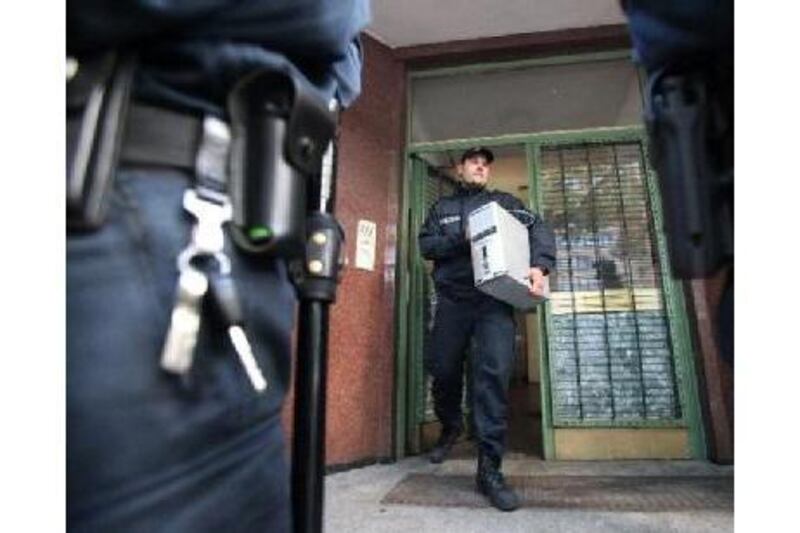LONDON // The leaking of the news of an alleged al Qa'eda plot to launch Mumbai-style attacks across Europe has hampered western intelligence agencies' ability to apprehend suspects, a British security official has said. "It is disappointing that word of this has come out," the security official, who wished to remain anonymous given the sensitivity of the subject, said yesterday in an exclusive interview. "It is one thing to know that an attack is being planned, it is quite another to identify the individuals who would carry such an attack and what their targets might be.
"Until you have gathered that sort of information, you stand no chance of bringing a successful prosecution and getting the terrorists locked up. There is a big difference between learning about a plot and foiling it." He added that Britain's intelligence services are unhappy that news of the plot was leaked in Washington. Information on the plans came from a German terrorist suspect who was detained in Kabul two months ago en route to Europe from Pakistan. He is currently in US custody at Bagram Airfield in Afghanistan.
The plot, which the German suspect said had the blessing of Osama bin Laden, according to a report on ABC, apparently involved groups of heavily armed young men mounting attacks at random in France, England and Germany, taking hostages and killing them, much as in Mumbai in 2008 when more than 150 people were killed. French intelligence officers have also been investigating suggestions that female suicide bombers might be involved and the US president, Barack Obama, has been briefed on the possibility of similar attacks in the United Sates.
US security sources have told Reuters that the plan, involving young extremists trained in al Qa'eda camps in Pakistan's tribal areas, was "credible but not specific". The German interior ministry said in a statement yesterday: "at present there are no concrete pointers to imminent attacks in Germany stemming from this". Increased strikes by US drones and helicopters against al Qa'eda targets in north-west Pakistan this month were reported by TheWall Street Journal to be pre-emptive strikes against terrorists involved in the European plot.
James Clapper, the director of national intelligence in the United States, declined to address specifically the European plot but said in a statement on Tuesday: "We know al Qa'eda wants to attack Europe and the United States. We continue to work closely with our European allies on the threat from international terrorism, including al Qa'eda." He added that the US and European intelligence services had been working closely in recent days "to disrupt terrorist plotting, identify and take action against potential operatives, and strengthen our defences against potential threats".
CNN yesterday identified the arrested German passport-holder as Ahmed Sidiqi, who was detained in Kabul in July and then transferred to US custody. Quoting a German counterterrorism official, the broadcaster said Mr Sidiqi was among several Germans who had travelled to north-west Pakistan last year, where he had joined the Islamic Movement of Uzbekistan, an extremist group allied to al Qa'eda. Mr Sidiqi, who worked for a cleaning company at Hamburg international airport, attended the Masjid Taiba mosque, formerly known as the Al Quds mosque. It became known as the meeting place of those behind the September 11 attacks, CNN reported.
Germany has been increasingly concerned about an estimated 200 young Muslims who have travelled from Germany to camps along the Pakistan-Afghanistan border in recent years. Britain and France have also been on a high state of alert this year, the former not only concerned about jihadists but also about the growing threat on the mainland from extremist republican groups in Northern Ireland. Brice Hortefeux, the French interior minister, said last week that France faced a real terrorism threat with fears growing of an attack from homegrown al Qa'eda cells. Paris officials evacuated the Eiffel Tower twice this month after bomb threats.
Jonathan Evans, head of MI5, Britain's internal security service, said this month that there remained "a serious risk of a lethal attack taking place" in the UK. Janet Napolitano, the US homeland security secretary, said in testimony before Congress last week, "we are all seeing increased activity by a more diverse set of groups and a more diverse set of threats". Ms Napolitano is expected to discuss the latest threat when she meets her European counterparts at a UN meeting on aviation security in Montreal, Canada, that ends today.
The official threat levels in France, Germany and the UK, which are already only one category below the maximum, have not been increased because of the latest plot. In Britain, that means the level stays at "severe", or that an attack is highly likely but is not considered imminent. Mohamed Omar Debhi, 43, a US citizen of Algerian descent, was arrested in Barcelona on Tuesday, accused of helping to finance al Qa'eda's North African wing, al Qa'eda in the Islamic Maghreb, Spain's national police said yesterday.






